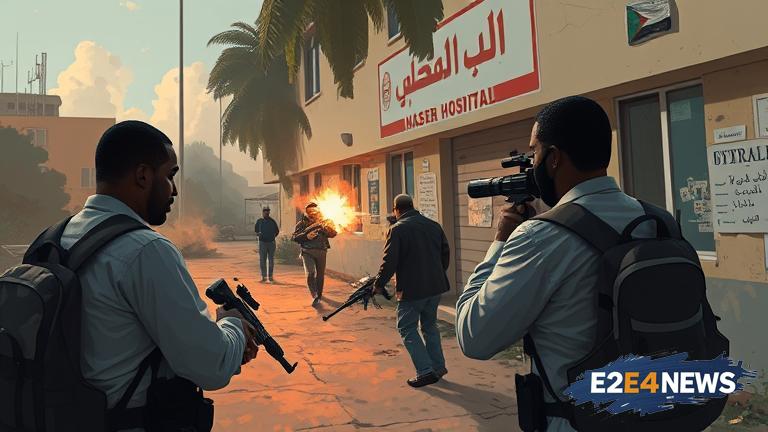The ongoing conflict between Israel and Gaza has resulted in a significant escalation of violence, with a recent incident involving a double-tap strike on Nasser Hospital in Gaza. The attack, which occurred on a day when multiple journalists were present, has raised concerns about the safety of media personnel in conflict zones. According to eyewitnesses, the first strike hit the hospital, followed by a second strike just minutes later, causing widespread destruction and chaos. The incident has been widely condemned, with many calling for an immediate investigation into the circumstances surrounding the attack. Journalists from various news organizations were among those caught in the crossfire, with some reporting injuries and others narrowly escaping harm. The Israeli military has stated that it is investigating the incident, but has thus far not provided any details about the circumstances leading up to the strike. The Gaza Health Ministry has reported a significant number of casualties, including several journalists who were killed or injured in the attack. The international community has expressed outrage over the incident, with many world leaders calling for a ceasefire and an end to the violence. The United Nations has also issued a statement condemning the attack and calling for an investigation. The incident has highlighted the dangers faced by journalists in conflict zones, where they often risk their lives to report on critical events. The use of double-tap strikes, which involve a second strike shortly after the first, has been particularly criticized, as it can increase the risk of harm to civilians and journalists. The Israeli military has defended its actions, stating that it takes all necessary precautions to avoid harming civilians, but the incident has raised questions about the effectiveness of these measures. The Gaza conflict has been ongoing for several years, with periodic escalations of violence resulting in significant loss of life and destruction of infrastructure. The international community has been working to broker a ceasefire, but so far, these efforts have been unsuccessful. The incident at Nasser Hospital has sparked widespread condemnation, with many calling for accountability and an end to the violence. The safety of journalists in conflict zones is a critical concern, and the incident has highlighted the need for greater protections and safeguards to prevent such incidents in the future. The use of advanced technologies, such as drones and precision-guided munitions, has increased the risk of harm to civilians and journalists, and the international community must work to develop new standards and protocols to mitigate these risks. The incident has also raised questions about the role of social media and journalism in conflict zones, where the dissemination of information can be critical in shaping public opinion and influencing policy. As the conflict continues, it is essential that all parties take steps to protect journalists and civilians, and to work towards a peaceful resolution to the conflict. The international community must also take a more active role in promoting accountability and investigating incidents such as the double-tap strike on Nasser Hospital. Ultimately, the safety of journalists and civilians must be a top priority, and all parties must work together to prevent such incidents in the future.





